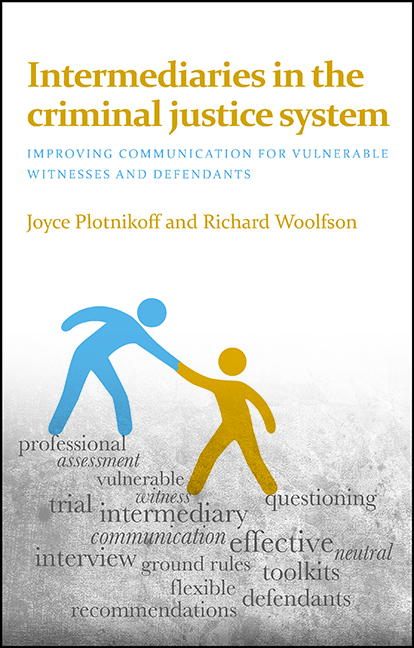 Intermediaries in the Criminal Justice System
Intermediaries in the Criminal Justice System Book contents
- Frontmatter
- Contents
- About the authors
- The Nuffield Foundation
- Acknowledgements
- Foreword
- one Introduction: a fresh pair of eyes
- two The intermediary scheme in England and Wales
- three Behind the scenes: planning to assess the witness
- four Assessment methods and involvement of the interviewer
- five Communication aids and stress reduction strategies
- six Contributing to the effectiveness of the police interview
- seven Negotiating professional space at the ground rules hearing
- eight Making the ground rules hearing effective
- nine ‘Every reasonable step’: preparation for giving evidence
- ten Cross-examination: research, case law, training and regulation
- eleven Cross-examination: intervention at trial
- twelve Cross-examination: challenges at the cutting edge
- thirteen The uneasy position of vulnerable defendants
- fourteen A new profession
- fifteen Conclusion
- References
- Index
- Table of cases
- Legislation
- Rules
- Practice directions
thirteen - The uneasy position of vulnerable defendants
Published online by Cambridge University Press: 08 March 2022
- Frontmatter
- Contents
- About the authors
- The Nuffield Foundation
- Acknowledgements
- Foreword
- one Introduction: a fresh pair of eyes
- two The intermediary scheme in England and Wales
- three Behind the scenes: planning to assess the witness
- four Assessment methods and involvement of the interviewer
- five Communication aids and stress reduction strategies
- six Contributing to the effectiveness of the police interview
- seven Negotiating professional space at the ground rules hearing
- eight Making the ground rules hearing effective
- nine ‘Every reasonable step’: preparation for giving evidence
- ten Cross-examination: research, case law, training and regulation
- eleven Cross-examination: intervention at trial
- twelve Cross-examination: challenges at the cutting edge
- thirteen The uneasy position of vulnerable defendants
- fourteen A new profession
- fifteen Conclusion
- References
- Index
- Table of cases
- Legislation
- Rules
- Practice directions
Summary
An intermediary sometimes assists a vulnerable person called to court as a prosecution witness; that person can appear in a different case as a defendant, without intermediary help. As intermediaries observe, only the side of the fence has changed, not the person’s communication needs. The overriding objective in Criminal Procedure Rule 1 (2015), ‘that criminal cases be dealt with justly’, includes dealing with the prosecution and defence fairly and recognising the defendant’s rights to a fair trial under Article 6 of the European Convention on Human Rights. Courts are obliged to take ‘every reasonable step’ to facilitate the defendant’s participation, including setting directions and ground rules, especially in intermediary cases. The aim is to enable defendants to give their best evidence, understand the proceedings and ‘engage fully’ with their defence; the pre-trial and trial process should be adapted as necessary (Criminal Procedure Rules 3.9(3)(b), 3.9(6) and 3.9(7), 2015; toolkit 8, Effective participation of young defendants, www. theadvocatesgateway.org). This requires the judiciary to ensure ‘by any appropriate means’ that defendants understand what is happening and what has been said by those on the Bench, the advocates and witnesses (Criminal Practice Directions 3D.2 and 3G.9, 2015).
Many defendants would meet the criteria governing the provision of special measures, including intermediary assistance, as set out in the Youth Justice and Criminal Evidence Act 1999; however, the Act specifically excludes defendants (section 17(1)). Over half of children and adults who offend have communication difficulties: many have learning difficulties and mental health problems, often combined with alcohol or drug misuse (Talbot, 2012; Criminal Justice Joint Inspection, 2014b). However, for reasons of political expediency and cost, the Act excluded vulnerable defendants from eligibility.
Pressure as a result of court decisions has led to a grudging legislative response. Some defendants under the age of 18 may now give evidence by live link (Police and Justice Act 2006, section 47, creating new section 33A-C, Youth Justice and Criminal Evidence Act 1999). A provision permitting appointment of an intermediary, on narrower grounds of eligibility than for vulnerable witnesses and restricted to the giving of evidence, has not been put into effect (Coroners and Justice Act 2009, section 104, creating new section 33BA(4), Youth Justice and Criminal Evidence Act 1999). The government continues to delay implementation on the grounds of resource implications.
- Type
- Chapter
- Information
- Intermediaries in the Criminal Justice SystemImproving Communication for Vulnerable Witnesses and Defendants, pp. 247 - 280Publisher: Bristol University PressPrint publication year: 2015


